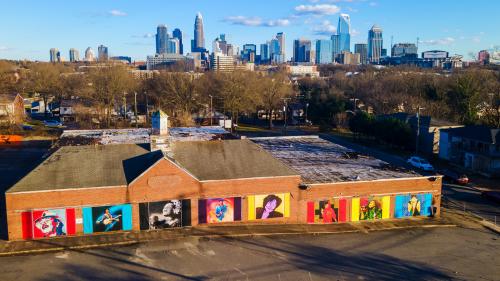
Historic West End | Charlotte, North Carolina
LISC-Charlotte

Neighborhood leaders are working to ensure the Historic West End’s Black legacy residents will benefit fully from a new wave of development.
The Challenge
Until the 1960s, the Historic West End was primarily an all-Black community where residents owned businesses and supported a thriving local economy. Desegregation shifted the neighborhood’s demographics and unraveled that economy. Redlining and other systematic and exclusionary policies suppressed property values. Investors bought property at less than true market values, extracting wealth from Black residents.
Today, the Historic West End’s long-term Black residents experience stark disparities. Income and education levels lag those of surrounding areas. Only 25% of residents live within a half mile of a full-service grocery store.
Despite these challenges, the opportunities are large. The long-vacant A&P grocery store site will be developed soon. A vacant lot across from Johnson C. Smith University is being turned into a public plaza. And the entire housing market is heating up – causing home values to increase and bringing much needed investment.
To take advantage of these opportunities – and ensure they benefit long-time Historic West End residents – LISC Charlotte has convened an active group of residents, business owners and other community stakeholders. Together, they are working to protect the Historic West End’s history and culture, and ensure its future reflects their voice and vision.

The Plan
Collaboration is at the heart of LISC-Charlotte’s strategy to build on the current development underway along the Beatties Ford Road corridor. Key pillars of the plan include homeownership, commercial development and neighborhood revitalization.
To ensure the development aligns with the neighborhood’s vision, LISC-Charlotte will develop a community-focused agenda that informs the revitalization and increases the neighborhood’s capacity to absorb new capital.
Toward that end, LISC-Charlotte and its partners will pursue:
- Support for small and commercial businesses – including technical assistance and lending products that address each phase of a business’s life cycle
- Training and education for Historic West End homeowners, including home repair and anti-displacement strategies and best practices
- Expanded support of the Westside Community Land Trust and of developers producing multifamily and homeownership properties
“We are thrilled to receive an award that will benefit the Historic West End corridor! Our neighborhood partners are already doing incredible work in their respective areas. Lifting their current efforts to new heights will continue to drive change – and create the opportunity for the stabilization and revitalization of the community to incorporate the vision of its residents.”
− Ralphine Caldwell, Executive Director, LISC-Charlotte
What Success Looks Like
Over the next three, 10 and 25 years, LISC-Charlotte and partners West Side Community Land Trust, For The Struggle and Historic West End Partners have set a course for achieving a range of tangible improvements to drive the revitalization of the Historic West End – while preserving the neighborhood’s legacy and culture.
Among the goals, the collaborative seeks to:
- Implement successful anti-displacement strategies
- Stabilize and increase the neighborhood’s Black-owned businesses
- Create new jobs with living wages for Black residents
- Optimize the location of quality food options
- Increase affordable rental and homeownership opportunities for Black residents
- Expand community engagement and place-making activities
- Improve residents’ health and safety

